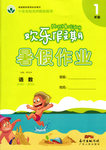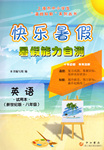题目内容
I didn't go to Colorado to ski. I went because I was persuaded to attend a two-day class at the Bridgestone Winter Driving School there.
Everyone in my family came along with me. The first morning,we sat in a small classroom and our instructor,Robert,told us what to expect. The course,he explained,was designed to make the cars slip and slide on ice and snow. “If you listen to us,” Robert assured the class, “you’11 be fine."
On a snowy day when I was 4,I had a car accident. I wasn't seriously hurt that day,but over the years the shock transformed into anxiety. When it snowed,I often called another parent at the elementary school my daughter attends to ask if he or she wouldn't mind driving my daughter the half-mile to school in the morning.
That first morning in Colorado,after we left the classroom and headed out to the track,my heart was racing. By the time Robert said, “Cristina,it's your turn." I was lightheaded. I carefUlly did what I was instructed to do but when I turned,I pulled the wheel too hard and hit a block of ice,my car turning almost 180 degrees. When the car came to a stop,I sat rigid,trying to catch my breath. Part of me wanted to get out and never drive again. But I was sitting there safely,wasn,t I? I had overcome one of my greatest fears — losing control of the car. I even felt a little excited.
For the rest of the class,I continued practising,and I got better enough so that a week later,when I arrived home and there was snow on the ground,I didn't even think about calling another parent to drive my daughter to school. “I can do this,” I told myself. And I did.
24. In the classroom,Robert intended to help participants to .
A. know each other
B. build up confidence
C. learn about the course
D. put theory into practice
25. The accident made the author afraid to .
A. have kids in her car B. drive on snowy days
C. drive long distances D. be in a car by herself
26. What can best describe the author's feelings after the first practice?
A. Mixed. B. Puzzled.
C. Thankful. D. Regretful.
27. What do we know about the class?
A. It's tiring. B. It's helpful.
C. It's expensive. D. It's interesting.
(个人情感)
本文是记叙文。作者由于儿时的一场车祸不敢在雪天开车,为此作者专门去冬季驾校练习,终于克服了自己的恐惧。
24. C.细节理觯题。根据第二段中的our instructor,Robert,told us what to expect. The course,h% explained…可知,Robert帮助学员们了解课程。
25. B.推理判断题。根据第三段中的When it snowed,I often called another parent at the elementary school my daughter attends to ask if he or she wouldn’t mind driving my daughter the half-mile to school in the morning 可知,一到下 雪天作者就请别的家长帮忙送自己的女儿去学 校。由此可推测,儿时的车祸使得作者不敢在 下雪天开车。
26. A.推理判断题。根据第四段中的I sat rigid,trying to catch my breath. Part of me wanted to get out and never drive again ... 1 had overcome one of my greatest fears — losing control of the car. I even fet a little excited 不难看出,第一次练 习结束后,作者既害怕又因为自己克服了恐惧 而感到激动,心情很复杂。
27. B.推理判断题。根据最后一段中的there was snow on the ground,I didn11 even think about calling another parent to drive my daughter to school. “I can do this,” I told myself. And I did 可知,再次遇到下雪天的时候,作者自己开车送女 儿去学校,这说明作者克服了自己的恐惧,课程 很有用。

 Happy holiday欢乐假期暑假作业广东人民出版社系列答案
Happy holiday欢乐假期暑假作业广东人民出版社系列答案 快乐暑假暑假能力自测中西书局系列答案
快乐暑假暑假能力自测中西书局系列答案